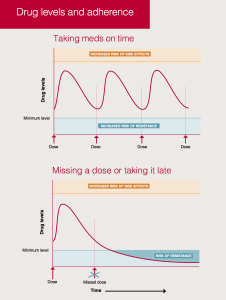Drug levels and adherence
HIV meds can only work if we remember to take them.
How well we take meds is referred to as adherence.
Good adherence includes both getting the time right and following advice about food.
- Rather than feeling life has to be lived on a schedule, understanding how timing affects drug levels can make adherence a more empowering part of life.
- Most oral drugs start to be absorbed into the bloodstream through the stomach wall. It is why food restrictions and recommendations are important. Some drugs – especially rilpivirine, protease inhibitors and Stribild and Genvoya – need to be taken with food to achieve the right levels.
- Once in the bloodstream these drugs are filtered though the liver and kidneys. So a lot of the active ingredients are cleared before they come into contact with HIV. But being transported in the blood also reaches CD4 cells, where the meds are directly active.
- Oral drugs take 1 to 2 hours to reach a peak level in blood. This level needs to be high enough for the drugs to work, but not so high as to cause side effects.
- Drug levels then steadily fall as your liver and/or kidneys continue to filter them.
- Long-acting injectable drugs are similar but over a different timescale. Cabotegravir and rilpivirine injections are still absorbed quickly but take about two months for drug levels to fall. There is then a window of 1-2 weeks for the next injection.
- The dose for each HIV drug is based on making sure that drug levels will be above a certain minimum level throughout the whole dosing period. By the time of the next dose, drugs levels still need to be high enough to stop drug resistance.
- So long as you don’t miss your meds, ART will control HIV for 24 hours a day, 7 days a week, 365 days a year.
- The top graph above shows that taking meds on time keeps average drug levels above the minimum needed to avoid drug resistance.
- The lower graph shows that if you are late or miss a dose, drug levels will continue to fall. If levels become too low to control HIV, drug resistance can develop.
- Sometimes, especially for children, meds can be in a syrup or other formulation.
- A combination using two long-acting injections is now available. This involves having intramuscular injections of cabotegravir and rilpivirine every eight weeks. The injections can be anytime between 7 and 9 weeks. If this window is missed it is important to use oral versions of these two drugs until the next injections.
Last updated: 1 January 2025.

